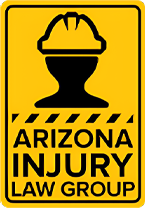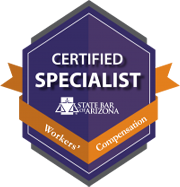Phoenix PTSD Workplace Injury Lawyer

Phoenix PTSD Workplace Injury Attorney
Many people associate workers’ compensation benefits with physical injuries, but mental injuries can be just as debilitating. One common work-related injury that can afflict an employee’s mental health is post-traumatic stress disorder. There are certain standards that have to be met before someone can claim worker’s compensation benefits for PTSD. Fortunately, a Phoenix PTSD workplace injury lawyer can guide you through the process so you can focus on recovery.
What Qualifies as PTSD Under State Law?
PTSD is most commonly associated with military veterans who witnessed or experienced repeated traumatic events. Anyone can experience this debilitating emotional injury. A car accident or witnessing a co-worker killed on the job can lead to symptoms of PTSD. The disorder can also result from perceiving that harm is imminent.
PTSD often goes untreated because the symptoms are not outwardly visible. Anyone who has PTSD may qualify for workers’ compensation benefits under state law. With the help of your workers’ compensation attorney, you will have to demonstrate that your symptoms are the result of “unexpected, unusual, or extraordinary stress.”
Ensuring that your claim meets this legal standard is crucial. Your lawyer will understand how to describe your mental health symptoms and the circumstances that led to your PTSD so you can strengthen your claim.
Common Causes of PTSD
Work-related PTSD can stem from various traumatic events. Accidents, assaults, verbal abuse, sexual harassment, or witnessing someone else being harmed or even killed can lead to PTSD symptoms. If your workplace induces high stress, that can lead to PTSD over time. Employees who have a lack of support may also be more prone to PTSD. The organization’s culture can contribute to PTSD as well.
PTSD can adversely affect work performance. Common symptoms like concentration difficulty and intrusive thoughts can impair focus and productivity. Absenteeism and lowered overall performance can result. Fortunately, with a change in work environment and proper treatment, PTSD symptoms can recede over time.
Symptoms of PTSD
PTSD symptoms include intrusive memories or flashbacks of the traumatic event, avoidance of triggers, negative changes in mood or cognition, and heightened arousal (such as being easily startled). People with PTSD often report that they constantly feel on edge. Without therapy and other forms of treatment, symptoms can persist for months or longer.
They may become more severe over time, especially when the employee returns to the same work environment every day that causes the stress or trauma that led to PTSD in the first place.
How a PTSD Workplace Injury Lawyer Can Help
Your PTSD workplace injury lawyer in Phoenix understands the state laws pertaining to workers’ compensation and what mental health conditions qualify for benefits. The language in the claim filing matters. Your lawyer can draft the claim so it meets the legal standard that can allow you to qualify for workers’ compensation benefits.
One requirement for your attorney is proving that your PTSD resulted from your time at work. This can be done by tying your symptoms to a specific event at work or to environmental factors at work that led to your PTSD symptoms. Another important step may involve going to a mental health professional for a diagnosis of PTSD.
Throughout the process, your lawyer can explain how the benefits work and what to expect throughout the process. Your attorney can provide details on how to remain in compliance with state rules throughout the process.
An attorney can collect the necessary information to build a strong case that allows for maximum benefits. If your benefits have been denied, your lawyer can craft a robust appeal, striving for the most favorable outcome for your case.
FAQs
Q: Is PTSD Considered a Work-Related Injury?
A: Yes. The Arizona Revised Statutes allow qualifying employees to receive workers’ compensation benefits following a mental injury. Specifically, the injury must be “unexpected, unusual, or extraordinary” and related to the injured party’s employment. With the help of an attorney, you can prove that your mental health affliction is serious and that time at work was a substantial contributing cause of PTSD.
Q: How Does PTSD Limit Your Ability to Work?
A: PTSD can seriously impede a worker’s ability to be productive and attentive while on the job. PTSD can lead to unease at work, inability to focus, and a continual feeling of being on edge. A worker who is suffering may appear unproductive, but their mental health affliction is often the underlying cause of their productivity issues. With proper treatment and reasonable changes in the work environment, workers with PTSD can regain their prior levels of productivity.
Q: What Are the Seven Symptoms of PTSD?
A: According to the National Institutes of Health, the top symptoms of PTSD include being easily startled, feeling tense, always being on guard, difficulty concentrating, difficulty sleeping, irritability, and aggressive outbursts. Symptoms are generally classified as either general arousal symptoms or cognition symptoms. A medical doctor or mental health professional can analyze your symptoms and provide a diagnosis.
Q: How Can Someone Snap Out of a PTSD Episode?
A: There is no easy or reliable way to “snap” out of a PTSD episode, although popular portrayals of war zones depict such efforts. Treatments for PTSD are often complex and possibly involve a combination of therapy, medications, and other treatments to address the symptoms properly. Talk therapy or cognitive behavioral therapy can help address the underlying causes of PTSD symptoms.
Q: What Does No-Fault Mean for Workers’ Compensation in Arizona?
A: Arizona’s “no-fault” system when it comes to workers’ comp means that an employer is obligated to provide reasonable benefits to a worker who is hurt on the job. Workers have a right to benefits through a workers’ compensation program, even if the injured employee is at fault or partly at fault for the injury.
Schedule Your Post-Traumatic Brain Injury Consultation Today
A hostile work environment or witnessing a traumatic event at work can lead to symptoms of PTSD. The disorder can make work very difficult, and PTSD symptoms are unlikely to subside without professional medical and mental health treatments. Under state law, you may be entitled to worker’s compensation benefits if your work environment caused your PTSD.
At Arizona Injury Law Group, our attorneys have years of experience helping workers who struggle with PTSD symptoms. Contact our traumatic brain injury lawyer today to start the process.
Get Help Today
Call Immediately For A Free, No Obligation Consultation And Let Us Help You Put Your Life Back On Track. Let Us Help You
Regain Normalcy And Stability Again. We Want To Help You Get The Benefits You Need And Deserve!


